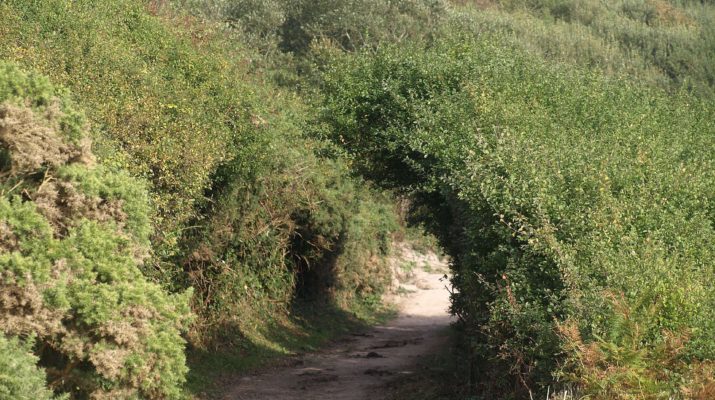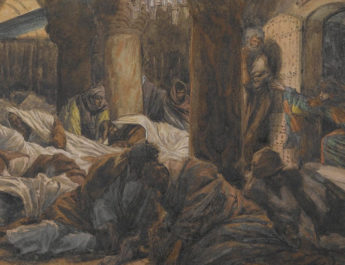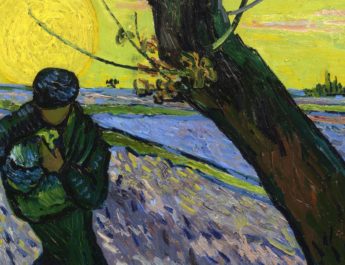Micah 6:1-8
Ordinary A10
1 HearA, B what the LordC says:
Rise, plead your caseD before the mountains,
and let the hills hear your voice.
2 Hear, you mountains, the controversyE of the Lord,
and you enduringF foundations of the earth;
for the Lord has a controversy with his people,
and he will contendG with Israel.H
A “hear” = shama. This is to hear, call, consent, or consider. It implies listening intelligently, giving attention, and, because of these two factors, obedience and action are often implied.
B Untranslated = na. This particle is used for requests or for urging. It can be we pray, now, I ask you, oh. This is the same “na” in “hosanna.”
C “Lord” = YHVH. From havah (to be, become) or hayah (to come to pass, become, be). This is the name of the God of Israel, the self-existent and eternal one, the tetragrammaton. This pronunciation has been lost to time so “Lord” is generally used in its place.
D “plead your case” = rib. This is properly to toss or grapple. It is used figuratively to mean wrangling and so for arguments, complaints, or disputes. It is used in a legal setting for pleading or defending a case.
E “controversy” = rib. Related to “plead your case” in v1. From rib (see note D above). This is strife or dispute. It could refer to a personal dispute or a lawsuit.
F “enduring” = ethan. 13x in OT. Root may mean to continue. This word is used specially to refer to a ruler or chief. Also means, hard, mighty, rough, strong, enduring, permanence, ever-flowing.
G “contend” = yakach. This word means to decide, prove, or be right. Here, it is in a reflexive form so it means argue.
H “Israel” = yisrael. From sarah (to persist, exert oneself, contend, persevere, wrestle, prevail) + el (God or god). This is God strives or one who strives with God; new name for Jacob and for his offspring. This refers to the people and to the land.
3 “O my people, what have I done to you?
In what have I weariedI you? AnswerJ me!
4 For I brought you up from the land of Egypt,
and redeemedK you from the house of slavery;L
and I sent beforeM you Moses,N
Aaron,O and Miriam.P
I “wearied” = laah. 19x in OT. This is to be weary or exhausted, parched, faint, or tired. It could also mean to be impatient, or have a hard time. Figuratively, this could refer to being grieved or disgusted. This is the root verb that Leah comes from.
J “answer” = anah. This is answer, respond, announce, sing, shout, or testify. It means to pay attention, which implies responding and, by extension, starting to talk. Used in a specific sense for singing, shouting, testifying, etc.
K “redeemed” = padah. This is to sever, which is to say to ransom. To secure someone’s release (by paying their debt to free them from slavery) and thus redeem, rescue, deliver, preserve. Can also be the redemption price.
L “slavery” = ebed. From abad (to work, serve, compel; any kind of work; used causatively, can mean to enslave or keep in bondage). This is a servant, slave, or bondservant.
M “before” = paneh. Literally “before your face.”
N “Moses” = mosheh. From mashah (to pull out in a literal or figurative sense, to draw out) OR from Egyptian mes or mesu (child, son i.e. child of…). This is Moses – the one drawn out from the water, which is to say, rescued. If derived from the Egyptian, his name would share a root with Rameses and Thutmose
O “Aaron” = aharon. Derivation uncertain. May mean “bearer of martyrs” OR be related to Ancient Egyptian ꜥḥꜣ rw (warrior lion) OR elevated, exalted, high mountain. This is Aaron. Seehttps://en.wiktionary.org/wiki/Aaron
P “Miriam” = miryam. 15x in OT. From marah (to be contentious, rebellious, bitter, provoking, disobedient; to be or make bitter or unpleasant; figuratively, to rebel or resist; causatively to provoke). This is Miriam.
5 O my people, remember nowQ what King BalakR of MoabS devised,T
what BalaamU son of BeorV answered him,
and what happened from ShittimW to Gilgal,X
that you may know the saving actsY of the Lord.”
Q “now” = na. Same as untranslated particle in v1.
R “Balak” = balaq. From balaq (to lay waste, devastate, annihilate). This is Balak – devastator.
S “Moab” = moab. May be from ab (father, ancestor, grandfather; father in a literal or figurative sense). This is Moab or Moabite. Name could mean “from her father” in reference to the incestuous relationship between Lot and his daughters. The name could also mean, more pleasantly, “seed of a father” or “desirable land.” See https://en.wikipedia.org/wiki/Moab
T “devised” = yaats. This is to advise, counsel, consult, decide, plan, purpose, or determine. It can also have a negative sense of conspire or devise.
U “Balaam” = bil’am. Probably from bal (not, none, nothing, a failure) [from balah (to grow old, wear out, waste away, consume, spend)] + am (people, folk, nation; also troops or attendants; used figuratively for a flock). This is Balaam – perhaps, not of the people, which is to say a foreigner.
V “Beor” = beor. 10x in OT. From baar (burn, consume, heat, remove; to consume by a fire or through eating; can also mean being brutish or wasting). This is Beor – a lamp or burning.
W “Shittim” = shittim. 5x in OT. From the same as shittah (the acacia tree or wood from that tree); from shot (whip or lash literal or figurative); from shut (to go around, push forth; used in a figurative sense to mean lash as when one rows in the sea – implies traveling). This is Shittim.
X “Gilgal” = gilgal. From galgal (wheel, wagon, whirl, whirlwind; something that rolls); from galal (to roll, roll away, wallow, commit, remove; rolling in a literal or figurative sense). This is Gilgal – perhaps circle of stones.
Y “saving acts” = tsedaqah. From the same as tsedeq (rightness, righteousness, vindication. It is everything that is just or ethical. That which is right in a natural, moral, or legal sense. It also includes just weights (i.e. true weights). Figuratively, this is justice, righteousness, equity – even prosperity). This is righteousness, justice, righteous acts, and moral virtue.
6 “With what shall I come beforeZ the Lord,
and bow myself before GodAA on high?BB
Shall I come before him with burnt offerings,CC
with calvesDD a year old?
7 Will the Lord be pleasedEE with thousands of rams,FF
with ten thousandsGG of riversHH of oil?
Shall I give my firstborn for my transgression,II
the fruit of my body for the sinJJ of my soul?”KK
Z “come before” = qadam. Perhaps from qedem (front, formerly, before, east, eternal, everlasting, antiquity). This is to come in front or be in front and so meet, anticipate, confront, receive, or rise. It sometimes means to meet for help.
AA “God” = Elohim.
BB “high” = marom. From rum (to be high, rise, exalted, become proud, display, offer, present, set apart, extol; to rise in a literal or figurative sense). This can be height, high place, or lofty. It can be either exalted or haughty/proud. It can refer to dignity or to heaven.
CC “burnt offerings” = olah. From alah (to go up, climb, approach, bring; to be high or actively climb; can be literal or figurative). This is a step, stairs, or some kind of ascent. It is also used for whole burnt offerings, being the offering in which the whole things is burned and rises as smoke. Burnt offerings where the least common of the offerings: most were eaten, shared with the priest and the one bringing the offering.
DD “calves” = egel. May be from the same as agol (round, circular – root meaning revolve). This is a male calf as one that frisks about. Often used for one that is almost grown up. This is also the word used for the molten calf in Ex 32.
EE “pleased” = ratsah. This is to be pleased with, delight, take pleasure in, or accept with favor. It can mean to approve or consent regarding something. It can also be used specifically of satisfying debts or being pardoned.
FF “rams” = ayil. From the same as ul (mighty, strength, body, belly; root may mean to twist and that implies strength and power). This is strength so it is used to indicate things that are strong or powerful: political chiefs, rams, posts, trees, oaks.
GG “ten thousands” = rebabah. 16x in OT. From rabab (being many or much, abounding, increasing, multiplying; cast together and so the sense of increasing, generally in number). This is abundance, a myriad. It can be an indefinite large amount or mean ten thousand or a million.
HH “rivers” = nachar. From nachal (to gain as a possession, divide for inheritance; to occupy for any reason). This is a brook, wadi, flood, river, stream. It can also refer to the valley in which there is a river during the rainy season. This word is also used for a mine shaft.
II “transgression” = pesha. From pasha (to rebel, offend, quarrel; making a break from proper authority so can also refer to an apostate). This is transgression, rebellion, or sin. It could be a revolt on a national scale or an individual moral one.
JJ “sin” = chatta’ah. From chata’ (to miss or go wrong and so to sin, bear the blame; it can also include the sense of forfeiting or lacking). This is sin itself as well as punishment for sin. It is sometimes used specifically to refer to sin that is habitual.
KK “soul” = nephesh. Related to naphash (to refresh or be refreshed). This is soul, self, person, emotion. It is a breathing creature. Can also refer to appetites and desires.
8 He has told you, O mortal,LL what is good;MM
and what does the Lord requireNN of you
but to do justice,OO and to love kindness,PP
and to walkQQ humblyRR with your God?SS
LL “mortal” = adam. Perhaps from adam (to be red, make ruddy); related to adamah (ground, dirt, earth). This is man, humankind, also Adam’s name. It refers to a human individual or humanity.
MM “good” = tob. This is good, beautiful, pleasant, agreeable, bountiful, at ease. This word is used for goodness as a concept, a good thing, a good person. This can refer to prosperity and welfare as well as joy, kindness, sweetness, and graciousness. So, this is ethically good, but also enjoyably good.
NN “require” = darash. This is seek, ask, inquire, care for. Generally it means following in pursuit or following as part of a search, which implies seeking or asking. Also used specially to mean worship. So, whereas previous verses have spoken of acts of human worship (making sacrifices) so that humans can seek/worship God, now God is saying here is what I seek from you.
OO “justice” = mishpat. From shaphat (to judge, defend, pronounce judgment, condemn, govern). This is a verdict or formal sentence whether from humans or from God. It includes the act of judging as well as the place that judging takes place, the suit itself, and the penalty. Abstractly, this is justice, which includes the rights of the participants.
PP “kindness” = chesed. From chasad (being good, kind, merciful; may mean bowing one’s neck as is done in the presence of an equal for courtesy’s sake; so, if one in a superior position is treating you like an equal, that is what is captured here). This is favor, goodness, kindness, loving kindness, pity, reproach, or a good deed. When done by God to humanity, this is mercy/loving kindness. When done by humanity to God, it is piety.
QQ “walk” = halak. This is go, come, walk. It is walk literally and figuratively and includes people and animals. It can be used figuratively for one’s moral life – how we walk according to God’s way or against it. It can also refer to the walk of life as in the course one’s life takes, the choices we make, etc.
RR “humbly” = tsana. 2x in OT. This is modestly, humbly, or as one who is lowly. This is go, come, walk. It is walk literally and figuratively and includes people and animals. It can be used figuratively for one’s moral life – how we walk according to God’s way or against it. It can also refer to the walk of life as in the course one’s life takes, the choices we make, etc.
SS “God” = Elohim.
Image Credit: “Coast Path Above Aesop’s Bed” by Derek Harper.




